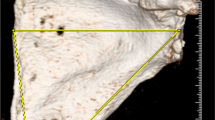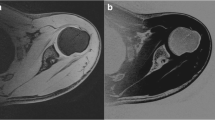Abstract
Objective
To assess the ability of 3D MR shoulder reconstructions to accurately quantify glenoid bone loss in the clinical setting using findings at the time of arthroscopy as the gold standard.
Materials and methods
Retrospective review of patients with MR shoulder studies that included 3D MR reconstructions (3D MR) produced using an axial Dixon 3D-T1W-FLASH sequence at our institution was conducted with the following inclusion criteria: history of anterior shoulder dislocation, arthroscopy (OR) performed within 6 months of the MRI, and an estimate of glenoid bone loss made in the OR using the bare-spot method. Two musculoskeletal radiologists produced estimates of bone loss along the glenoid width, measured in mm and %, on 3D MR using the best-fit circle method, which were then compared to the OR measurements.
Results
There were a total of 15 patients (13 men, two women; mean age, 28, range, 19–51 years). There was no significant difference, on average, between the MRI (mean 3.4 mm/12.6 %; range, 0–30 %) and OR (mean, 12.7 %; range, 0–30 %) measurements of glenoid bone loss (p = 0.767). A 95 % confidence interval for the mean absolute error extended from 0.45–2.21 %, implying that, when averaged over all patients, the true mean absolute error of the MRI measurements relative to the OR measurements is expected to be less than 2.21 %. Inter-reader agreement between the two readers had an IC of 0.92 and CC of 0.90 in terms of percentage of bone loss.
Conclusions
3D MR reconstructions of the shoulder can be used to accurately measure glenoid bone loss.




Similar content being viewed by others
References
Itoi E, Lee SB, Berglund LJ, Berge LL, An KN. The effect of a glenoid defect on anteroinferior stability of the shoulder after Bankart repair: a cadaveric study. J Bone Joint Surg Am. 2000;82:35–46.
Burkhart SS, De Beer JF. Traumatic glenohumeral bone defects and their relationship to failure of arthroscopic Bankart repairs: significance of the inverted-pear glenoid and the humeral engaging Hill–Sachs lesion. Arthroscopy. 2000;16:677–94.
Greis PE, Scuderi MG, Mohr A, Bachus KN, Burks RT. Glenohumeral articular contact areas and pressures following labral and osseous injury to the anteroinferior quadrant of the glenoid. J Should Elb Surg. 2002;11:442–51.
Lo IK, Perten PM, Burkhart SS. The inverted pear glenoid: an indicator of significant glenoid bone loss. Arthroscopy. 2004;20:169–74.
Burkhart SS, Debeer JF, Tehrany AM, Parten PM. Quantifying glenoid bone loss arthroscopically in shoulder instability. Arthroscopy. 2002;18:488–91.
Boileau P, Villalba M, Hery JY, Balg F, Ahrens P, Neyton L. Risk factors for recurrence of shoulder instability after arthroscopic Bankart repair. J Bone Joint Surg Am. 2006;88:1755–63.
Tauber M, Resch H, Forstner R, Raffl M, Schauer J. Reasons for failure after surgical repair of anterior shoulder instability. J Should Elb Surg. 2004;13:279–85.
Bigliani LU, Newton PM, Steinmann SP, Conner PM, McIlveen SJ. Glenoid rim lesions associated with recurrent anterior dislocation of the shoulder. Am J Sports Med. 1998;26:41–5.
Lynch JR, Clinton JM, Dewing CB, Warme WJ, Matsen 3rd FA. Treatment of osseous defects associated with anterior shoulder instability. J Should Elb Surg. 2009;18:317–28.
Stevens KJ, Preston BJ, Wallace WA, Kerslake RW. CT imaging and three-dimensional reconstructions of shoulders with anterior glenohumeral instability. Clin Anat. 1999;12:326–36.
Itoi E, Lee SB, Amrami KK, Wenger DE, An KN. Quantitative assessment of classic anteroinferior bone Bankart lesions by radiography and computed tomography. Am J Sports Med. 2003;31:112–8.
Kwon YW, Powell KA, Yum JK, Brems JJ, Iannotti JP. Use of three-dimensional computed tomography for the analysis of the glenoid anatomy. J Should Elb Surg. 2005;14:85–90.
Griffith JF, Yung PS, Antonio GE, Tsang PH, Ahuja AT, Chan KM. CT compared with arthroscopy in quantifying glenoid bone loss. AJR. 2007;189:1490–3.
Chuang TY, Adams CR, Burkhart SS. Use of preoperative three-dimensional computed tomography to quantify glenoid bone loss in shoulder instability. Arthroscopy. 2008;24:376–82.
Griffith JF, Antonio GE, Yung PS, Wong EM, Yu AB, Ahuja AT, et al. Prevalence, pattern, and spectrum of glenoid bone loss in anterior shoulder dislocation: CT analysis of 218 patients. AJR. 2008;190:1247–54.
Provencher MT, Bhatia S, Ghodadra NS, Grumet RC, Bach BR, Dewing CB, et al. Recurrent shoulder instability: current concepts for evaluation and management of glenoid bone loss. J Bone Joint Surg Am. 2010;92 Suppl 2:133–51.
Huijsmans PE, Haen PS, Kidd M, Wouter JD, Willems JW. The shape of the inferior part of the glenoid: a cadaveric study. J Should Elb Surg. 2006;15:759–63.
Huijsmans PE, Haen PS, Kidd M, Dhert WJ, van der Hulst VP, Willems WJ. Quantification of a glenoid defect with three-dimensional computed tomography and magnetic resonance imaging: a cadaveric study. J Should Elb Surg. 2007;16:803–9.
Gyftopoulos S, Hasan S, Bencardino J, Mayo J, Nayyar S, Babb J, et al. Diagnostic accuracy of MRI in the measurement of glenoid bone loss. AJR. 2012;199:873–8.
Tian CY, Shang Y, Zheng ZZ. Glenoid bone lesions: comparison between 3D VIBE images in MR arthrography and nonarthrographic MSCT. J Magn Reson Imaging. 2012;36:231–6.
Gyftopoulos S, Yemin A, Mulholland T, Bloom M, Storey P, Geppert C, et al. 3DMR osseous reconstructions of the shoulder using a gradient-echo based two-point Dixon reconstruction: a feasibility study. Skeletal Radiol. 2013;42:347–52.
Lee RKL, Griffith J, Tong MMP, Sharma N, Yung P. Glenoid bone loss: assessment with MR imaging. Radiology. 2013;267:496–502.
Rerko MA, Pan X, Donaldson C, Jones GL, Bishop JY. Comparison of various imaging techniques to quantify glenoid bone loss in shoulder instability. J Should Elb Surg. 2013;22:528–34.
Bokor DJ, O’Sullivan MD, Hazan GJ. Variability of measurement of glenoid version on computed tomography scan. J Should Elb Surg. 1999;8:595–8.
Sugaya H, Moriishi J, Dohi M, Kon Y, Tsuchiya A. Glenoid rim morphology in recurrent anterior glenohumeral instability. J Bone Joint Surg Am. 2003;85:878–84.
Taylor DC, Arciero RA. Pathologic changes associated with shoulder dislocations: arthroscopic and physical examination findings in first-time, traumatic anterior dislocations. Am J Sports Med. 1997;25:306–11.
Lazarus MD, Sidles JA, Harryman II DT, Matsen III FA. Effect of a chondral- labral defect on glenoid concavity and glenohumeral stability: a cadaveric model. J Bone Joint Surg Am. 1996;78:94–102.
Piasecki DP, Verma NN, Romeo AA, Levine WN, Bach Jr BR, Provencher MT. Glenoid bone deficiency in recurrent anterior shoulder instability: diagnosis and management. J Am Acad Orthop Surg. 2009;17:482–93.
Latarjet M. Treatment of recurrent dislocation of the shoulder. Lyon Chir. 1954;49:994–7. French.
Helfet AJ. Coracoid transplantation for recurring dislocation of the shoulder. J Bone Joint Surg Br. 1958;40:198–202.
Warner JJ, Gill TJ, O’hollerhan JD, Pathare N, Millett PJ. Anatomical glenoid reconstruction for recurrent anterior glenohumeral instability with glenoid deficiency using an autogenous tricortical iliac crest bone graft. Am J Sports Med. 2006;34:205–12.
Provencher MT, Ghodadra N, LeClere L, Solomon DJ, Romeo AA. Anatomic osteochondral glenoid reconstruction for recurrent glenohumeral instability with glenoid deficiency using a distal tibia allograft. Arthroscopy. 2009;25:446–52.
Provencher MT, Detterline AJ, Ghodadra N, Romeo AA, Bach BR, Cole BJ, et al. Measurement of glenoid bone loss: a comparison of measurement error between 45° and 0° bone loss models and with different posterior arthroscopy portal locations. Am J Sports Med. 2008;36:1132–8.
Palmer WE, Brown JH, Rosenthal DI. Labral-ligamentous complex of the shoulder: evaluation with MR arthrography. Radiology. 1994;190:645–51.
Gusmer PB, Potter HG, Schatz JA, Wickiewicz TL, Altchek DW, O’Brien SJ, et al. Labral injuries: accuracy of detection with unenhanced MR imaging of the shoulder. Radiology. 1996;200:519–24.
Beltran J, Bencardino J, Mellado J, Rosenberg ZS, Irish RD. MR arthrography of the shoulder: variants and pitfalls. Radiographics. 1997;17:1403–12.
Zanetti M, Weishaupt D, Jost B, Gerber C, Hodler J. MR imaging for traumatic tears of the rotator cuff: high prevalence of greater tuberosity fractures and subscapularis tendon tears. AJR. 1999;172:463–7.
Hayes ML, Collins MS, Morgan JA, Wenger DE, Dahm DL. Efficacy of diagnostic magnetic resonance imaging for articular cartilage lesions of the glenohumeral joint in patients with instability. Skeletal Radiol. 2010;39:1199–204.
Kralinger F, Aigner F, Longato S, Rieger M, Wambacher M. Is the bare spot a consistent landmark for shoulder arthroscopy? A study of 20 embalmed glenoids with 3-dimensional computed tomographic reconstruction. Arthroscopy. 2006;22:428–32.
Conflict of interest
The authors declare that they have no conflicts of interest.
Author information
Authors and Affiliations
Corresponding author
Rights and permissions
About this article
Cite this article
Gyftopoulos, S., Beltran, L.S., Yemin, A. et al. Use of 3D MR reconstructions in the evaluation of glenoid bone loss: a clinical study. Skeletal Radiol 43, 213–218 (2014). https://doi.org/10.1007/s00256-013-1774-5
Received:
Revised:
Accepted:
Published:
Issue Date:
DOI: https://doi.org/10.1007/s00256-013-1774-5




